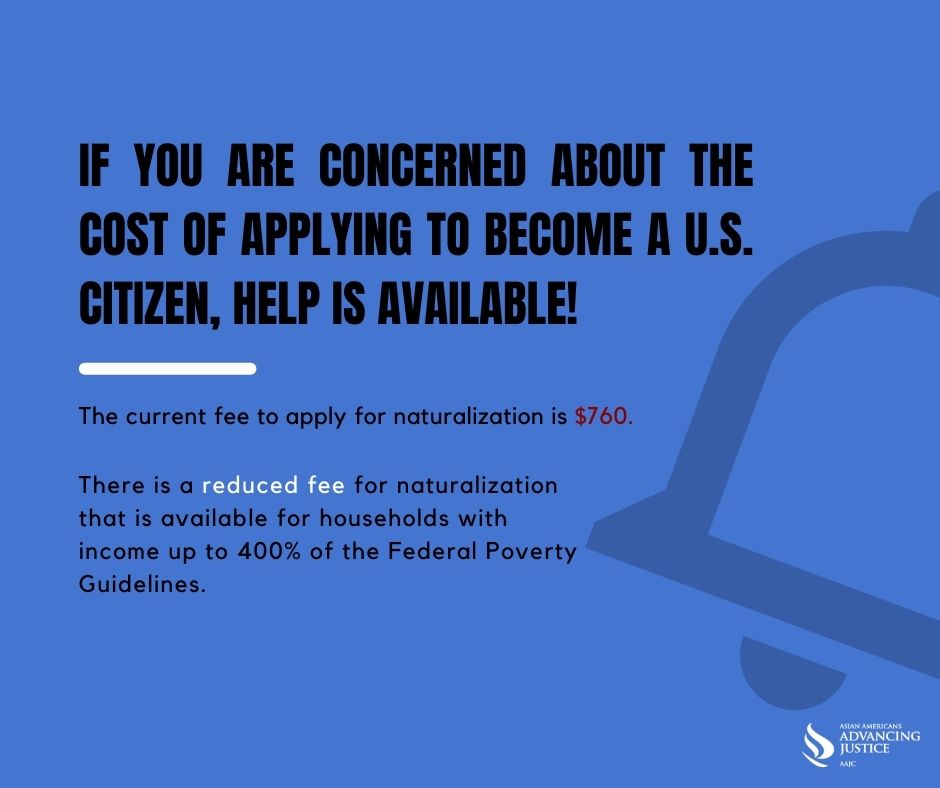Citizenship Clinics
As the fastest growing racial group in the nation, Asian Americans have the opportunity to shape the country we live in. By becoming a citizen, you can make your voice heard and insist our representatives take our communities' needs into account when making decisions that affect us all.


New Americans Campaign
The New Americans Campaign partners in the Washington, D.C., metro area regularly hold low-cost workshops to provide citizenship application assistance. For information on upcoming workshops, go to facebook.com/DCNewAmericans.
Click here for more information about the New Americans Campaign. (PDF Flyer)
Click here for Frequently Asked Questions on Naturalization (PDF)
You may also call 202-39-3572 or register online for workshops hosted by the Asian Pacific American Legal Resource Center (APALRC).
Why Attend a Workshop?
We know the naturalization process can be daunting. That's why we want to help you navigate the system, understand the benefits of becoming a U.S. citizen and access the resources to help you complete your application. The following information is not comprehensive, but can help you get started. Contact us to find out more, and click here to read stories from Asian Americans who naturalized, and what U.S. citizenship means to them.
Know Your Rights
Reference these fact sheets created by the ACLU to know your rights if you are stopped by police, immigration agents, or the FBI.
English | (Arabic) العَرَبِيَّة | 中文(简) (Chinese) | Creole
فارسی (Farsi) | Français (French) | Bahasa Indonesia (Indonesian)
한국어 (Korean) | Português (Portuguese) | Soomaali (Somali)
Español (Spanish) | Tagalog | (Urdu) اُردُو | Tiếng Việt (Vietnamese)
Why become a U.S. Citizen?
- You can VOTE and run for elected office
- You will be eligible for a U.S. passport, making international travel easy
- You won't have to worry about being deported, losing your visa, or losing your lawful permanent resident (LPR) status
- If you have family living abroad, you could bring them to live in the U.S. more quickly
- You can apply for government jobs that require U.S. citizenship
How do I know if I qualify?
- You're at least 18 years old
- You've lived in the U.S. as a green card holder for more than five years
- You've been physically present in the U.S. for more than two and a half years
- You can speak, read, and write basic English
- You can pass a basic test on U.S. government and history
If you're unsure of whether you qualify, the best thing to do is contact APALRC's helpline at 202-393-3572 to learn more.
What if I'm not fully fluent in English?
- You need to be proficient, not fluent, in order to pass the test. You just need to be able to speak, read and write in basic English.
- Some older individuals are exempt from the English language requirement.
- If you are 50 or older and have lived in the U.S. as a permanent resident (with a "green card") for 20 years, you will not be tested on your English skills. You still need to take the civics test, but may take it in the language of your choice.
- If you are 55 or older and have lived in the U.S. as a permanent resident (with a "green card") for 15 years, you will not be tested on your English skills.You still need to take the civics test, but may take it in the language of your choice.
- If you are 65 or older and have lived in the U.S. as a permanent resident for 20 years, you will not be tested on your English skills.You will be given a simplified version of the civics test, which you may take in the language of your choice.
- In-language study materials are available to help you prepare for the civics test.
The fees to apply for U.S. citizenship are high. And I hear that lawyers are expensive. How can I afford to become a citizen now?
- If you currently receive benefits such as Medicaid, food stamps (now part of the Supplemental Nutrition Assistance Program or SNAP), Temporary Assistance for Needy Families (TANF), or Supplemental Security Income (SSI), you may be eligible for a waiver of the $760 application fee.
- With eligibility increased up to 400% FPG, in 2024, an individual earning up to $60,240 and a household of 4 earning up to $124,800 can apply for the reduced fee of $380, which is half of the full fee for naturalization.
